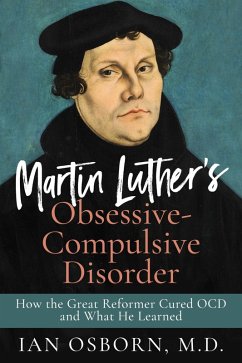That is how Martin Luther described the terrifying religious fears he suffered as a young man.
Up to now, no one has correctly diagnosed them. Dr. Osborn demonstrates that Luther's tormenting thoughts represented an unmistakable case of clinical obsessive-compulsive disorder. Remarkably, Luther overcame his fears through employing a form of modern "exposure and response prevention therapy," recognized today as the treatment of choice for OCD. Dr. Osborn makes clear that it was precisely through experiencing and curing his fears that Luther learned the truth about righteousness and faith. Without the benefit of his obsessional fears, one could argue, the Great Reformer would never have pursued the Reformation at all.
This book is essential reading for OCD sufferers, Martin Luther fans, historians, and students of religion and psychology alike.
Dieser Download kann aus rechtlichen Gründen nur mit Rechnungsadresse in A, B, CY, CZ, D, DK, EW, E, FIN, F, GR, H, IRL, I, LT, L, LR, M, NL, PL, P, R, S, SLO, SK ausgeliefert werden.


